How Can I Tell if I Have Shared Workbook in Excel O365
Interfacing Excel in C++ is task that I needed to overcome recently, so I thought I would mail some code and instructions on the said topic. Some online articles that I constitute to be useful include the following:
A Brief Introduction to C++ and Interfacing with Excel
Accessing Excel Spreadsheets via C++
Programming Excel COM Objects in C++
Without further ado, or huge swathes of tedious theory, here are the steps needed to at least go you interfacing with Microsoft Excel via C++:
1: Ensure pre-requisite files are installed and located
We must ensure that a number of Microsoft libraries and their file locations have been installed and located, namely MSO.DLL, VBE6EXT.OLB and EXCEL.EXE. Make certain that you take a suitable version of Microsoft Excel installed, any version should do. In this example, Excel 2003 was used.
The locations of these files will apparently differ from auto to machine, so the get-go stride is to determine their whereabouts. In Windows seven for instance, I recommend using Windows Explorer search facility. To locate (say) 'VBE6EXT.OLB', click on the 'Figurer' icon at the left, and in the edit box at the upper right simply enter 'VBE6EXT.OLB' and allow Explorer do the rest:
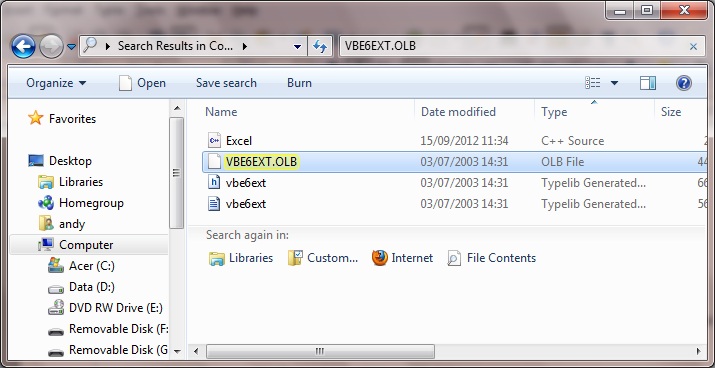
Correct-click on the file and select 'Open file location'. If yous and so click inside the file location edit box, this will give you the location you lot demand, which y'all tin then copy and paste:
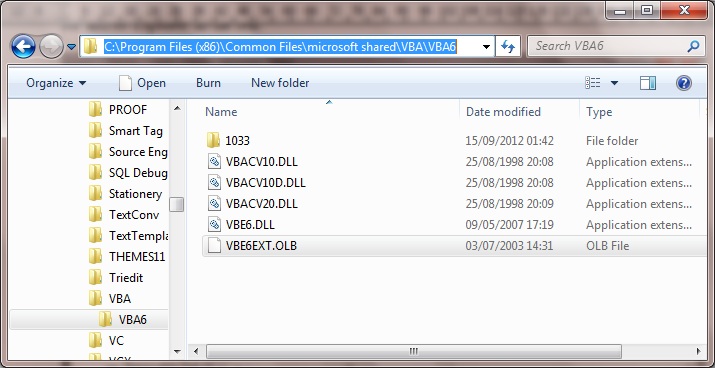
In my example, the location of the 'VBE6EXT.OLB' is
"C:\Programme Files (x86)\Common Files\microsoft shared\VBA\VBA6\\VBE6EXT.OLB"
Practise the same for the MSO.DLL and EXCEL.EXE files and y'all are and then in a position to proceed to the next footstep.
ii. Fix upwardly the Microsoft libraries
In order to utilise Excel functionality from within a C++ plan we utilize the Microsoft Component Object Model (COM). The required import libraries are shown below and need to be included in whatsoever C++ application that interfaces with Excel.
Merely use the file directories you found on your own computer for each #import, remembering to replace unmarried backslashes ('\') with double backslashes ('\\'), since the single backslash is classed equally a special character:
#import "C:\\Program Files (x86)\\Common Files\\microsoft shared\\OFFICE11\\MSO.DLL" \ rename( "RGB", "MSORGB" ) using namespace Part; #import "C:\\Program Files (x86)\\Common Files\\microsoft shared\\VBA\\VBA6\\VBE6EXT.OLB" using namespace VBIDE; #import "C:\\Program Files (x86)\\Microsoft Role\\OFFICE11\\EXCEL.EXE" \ rename( "DialogBox", "ExcelDialogBox" ) \ rename( "RGB", "ExcelRGB" ) \ rename( "CopyFile", "ExcelCopyFile" ) \ rename( "ReplaceText", "ExcelReplaceText" ) \ exclude( "IFont", "IPicture" ) no_dual_interfaces
rename is used to alter certain strings in the import library to avoid clashes with other libraries containing functions, variables or classes with the same proper name. exclude prevents the import of specified items. no_dual_interfaces must also be included for the correct functioning of the Excel application function.
iii. Use the Excel Object Model in your C++ code
The Excel Object Model contains a huge number of functions and objects. We volition concentrate on just a few of those required to perform this tasks of reading from and writing to the Excel spreadsheet. Declaring an Excel Awarding Object arrow is simple enough:
Excel::_ApplicationPtr pXL;
Once created, nosotros can apply this pointer to open for reading and writing our Excel Workbook of choice:
pXL->Workbooks->Open( Fifty"C:\\dump\\book.xls" );
Ready the Visible parameter depending on whether you would like the Excel spreadsheet to be displayed or not:
pXL->Visible = false;
This is how we can admission the agile Excel Worksheet and the cells within it:
Excel::_WorksheetPtr pWksheet = pXL->ActiveSheet; Excel::RangePtr pRange = pWksheet->Cells;
To read the values of private cells, simply use the Excel::RangePtr pointer above, remembering that in Excel cells must start from index = 1:
double value = pRange->Detail[1][1];
While writing and modifying individual cells is just as straightforward:
pRange->Item[one][one] = 5.4321;
For instance, I use the following simple Excel worksheet with a few modified cells:
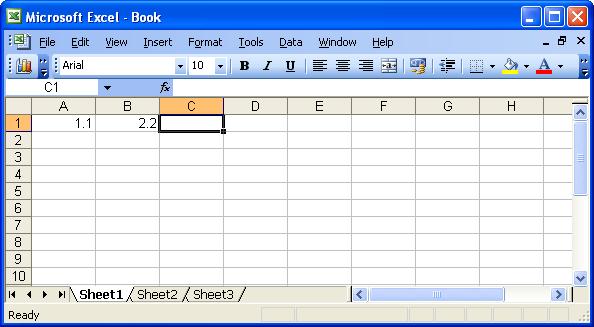
I then run the case code in order to read the prison cell values, modify them and relieve the spreadsheet respectively:
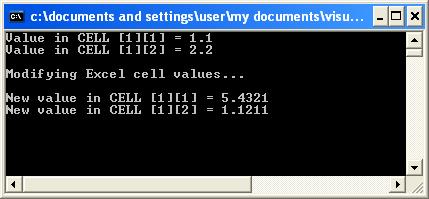
Upon re-opening the spreadsheet "book.xls" notice how the cells have been updated and saved:
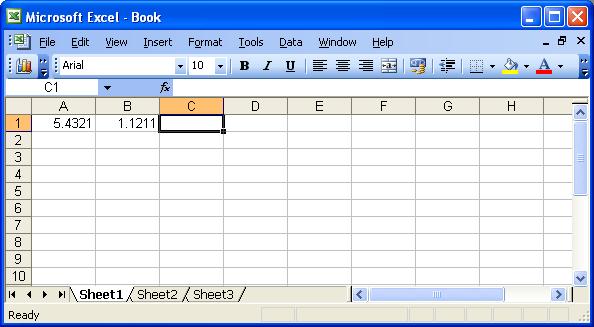
Full code listing: Function 2003 Example
#include <iostream> // Make sure your file paths for MSO.DLL, VBE6EXT.OLB and EXCEL.EXE are 100% correct // For 32-chip systems the file path is ordinarily "C:\\Plan Files\\..." // For 64-bit systems the file path is commonly "C:\\Program Files (x86)\\..." // #import "C:\\Program Files (x86)\\Mutual Files\\microsoft shared\\OFFICE11\\MSO.DLL" #import "C:\\Programme Files\\Mutual Files\\Microsoft Shared\\OFFICE11\\MSO.DLL" \ rename( "RGB", "MSORGB" ) using namespace Office; //#import "C:\\Plan Files (x86)\\Mutual Files\\microsoft shared\\VBA\\VBA6\\VBE6EXT.OLB" #import "C:\Plan Files\\Common Files\\microsoft shared\\VBA\\VBA6\\VBE6EXT.OLB" using namespace VBIDE; // #import "C:\\Programme Files (x86)\\Microsoft Office\\OFFICE11\\EXCEL.EXE" #import "C:\\Programme Files\\Microsoft Part\\OFFICE11\\EXCEL.EXE" \ rename( "DialogBox", "ExcelDialogBox" ) \ rename( "RGB", "ExcelRGB" ) \ rename( "CopyFile", "ExcelCopyFile" ) \ rename( "ReplaceText", "ExcelReplaceText" ) int chief() { HRESULT 60 minutes = CoInitializeEx(0, COINIT_MULTITHREADED); if (FAILED(60 minutes)) { std::cout << "Failed to initialize COM library. Mistake code = 0x" << std::hex << hr << std::endl; return hr; } // Create Excel Awarding Object pointer Excel::_ApplicationPtr pXL; if ( FAILED( pXL.CreateInstance( "Excel.Application" ) ) ) { std::cout << "Failed to initialize Excel::_Application!" << std::endl; render 0; } // Open the Excel Workbook, but don't make it visible pXL->Workbooks->Open( L"C:\\dump\\book.xls" ); //pXL->Visible[ 0 ] = false; // sometimes generates error? pXL->PutVisible(0, FALSE); // Access Excel Worksheet and return arrow to Worksheet cells Excel::_WorksheetPtr pWksheet = pXL->ActiveSheet; pWksheet->Name = L"Sheet1"; Excel::RangePtr pRange = pWksheet->Cells; // Read an Excel information cell. (Note Excel cells start from index = 1) double value1 = pRange->Item[i][1]; std::cout << "Value in CELL [1][1] = " << value1 << std::endl; double value2 = pRange->Item[one][2]; std::cout << "Value in CELL [1][2] = " << value2 << std::endl; // Write/change Excel data cells + salve. (reopen xls file to verify) std::cout << std::endl; std::cout << "Modifying Excel jail cell values..." << std::endl; std::cout << std::endl; pRange->Item[ane][ane] = five.4321; pRange->Item[1][2] = 1.1211; // Output new value value1 = pRange->Item[1][ane]; std::cout << "New value in Cell [1][one] = " << value1 << std::endl; value2 = pRange->Item[one][2]; std::cout << "New value in Cell [ane][2] = " << value2 << std::endl; // Switch off alert prompting to relieve as pXL->PutDisplayAlerts( LOCALE_USER_DEFAULT, VARIANT_FALSE ); // Save the values in volume.xml and release resources pWksheet->SaveAs( "C:\\dump\\volume.xls" ); pWksheet->Release(); // And switch dorsum on again... pXL->PutDisplayAlerts( LOCALE_USER_DEFAULT, VARIANT_TRUE ); pXL->Quit(); render 0; } Full lawmaking listing: Role 2013 Instance
The following case was also seen to piece of work on a more contempo version of Excel (2013).
One or ii differences in where the pre-requisite import files, executables etc were located simply that'south nigh it:
#include <iostream> // Brand sure your file paths for MSO.DLL, VBE6EXT.OLB and EXCEL.EXE are 100% correct #import "C:\\Program Files\\Microsoft Office 15\\root\\vfs\\ProgramFilesCommonX86\\Microsoft Shared\\OFFICE15\\MSO.DLL" \ rename( "RGB", "MSORGB" ) \ rename( "DocumentProperties", "DocumentPropertiesXL" ) no_dual_interfaces using namespace Office; #import "C:\\Programme Files\\Microsoft Part 15\\root\\vfs\\ProgramFilesCommonX86\\Microsoft Shared\\VBA\\VBA6\\VBE6EXT.OLB" using namespace VBIDE; #import "C:\\Plan Files\\Microsoft Office 15\\root\\office15\\EXCEL.EXE" \ exclude("IFont", "IPicture") \ rename( "DialogBox", "ExcelDialogBox" ) \ rename( "RGB", "ExcelRGB" ) \ rename( "CopyFile", "ExcelCopyFile" ) \ rename( "ReplaceText", "ExcelReplaceText" ) int principal() { HRESULT hr = CoInitializeEx(0, COINIT_MULTITHREADED); if (FAILED(hr)) { std::cout << "Failed to initialize COM library. Fault code = 0x" << std::hex << hour << std::endl; return hr; } // Create Excel Application Object arrow Excel::_ApplicationPtr pXL; if ( FAILED( pXL.CreateInstance( "Excel.Application" ) ) ) { std::cout << "Failed to initialize Excel::_Application!" << std::endl; return 0; } // Open up the Excel Workbook, only don't make it visible pXL->Workbooks->Open up( L"C:\\dump\\book.xls" ); //pXL->Visible[ 0 ] = imitation; // sometimes generates error? pXL->PutVisible(0, Imitation); // Access Excel Worksheet and return pointer to Worksheet cells Excel::_WorksheetPtr pWksheet = pXL->ActiveSheet; pWksheet->Proper name = 50"Sheet1"; Excel::RangePtr pRange = pWksheet->Cells; // Read an Excel data cell. (Note Excel cells start from index = 1) double value1 = pRange->Item[1][1]; std::cout << "Value in Prison cell [one][one] = " << value1 << std::endl; double value2 = pRange->Item[one][2]; std::cout << "Value in CELL [i][2] = " << value2 << std::endl; // Write/alter Excel data cells + save. (reopen xls file to verify) std::cout << std::endl; std::cout << "Modifying Excel cell values..." << std::endl; std::cout << std::endl; pRange->Detail[one][1] = v.4321; pRange->Particular[1][2] = 1.1211; // Output new value value1 = pRange->Particular[1][1]; std::cout << "New value in CELL [i][ane] = " << value1 << std::endl; value2 = pRange->Particular[ane][2]; std::cout << "New value in CELL [1][two] = " << value2 << std::endl; // Switch off alert prompting to save as pXL->PutDisplayAlerts( LOCALE_USER_DEFAULT, VARIANT_FALSE ); // Save the values in book.xml and release resource pWksheet->SaveAs( "C:\\dump\\book.xls" ); pWksheet->Release(); // And switch dorsum on again... pXL->PutDisplayAlerts( LOCALE_USER_DEFAULT, VARIANT_TRUE ); pXL->Quit(); return 0; } I final thing – delight exist aware that any existing Excel processes even so running in the background must be closed downwardly before running this program, otherwise errors are likely to occur. For example you lot may be debugging this program and then determine to leave before pXL->Quit() is called:
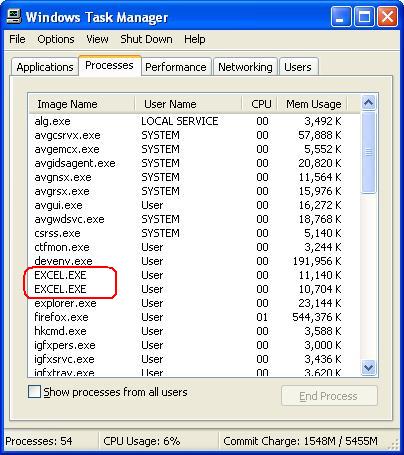
Source: https://www.technical-recipes.com/2012/how-to-interface-with-excel-in-c/
0 Response to "How Can I Tell if I Have Shared Workbook in Excel O365"
Post a Comment